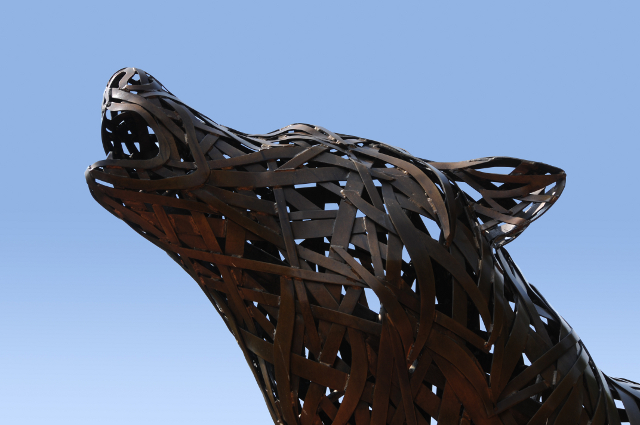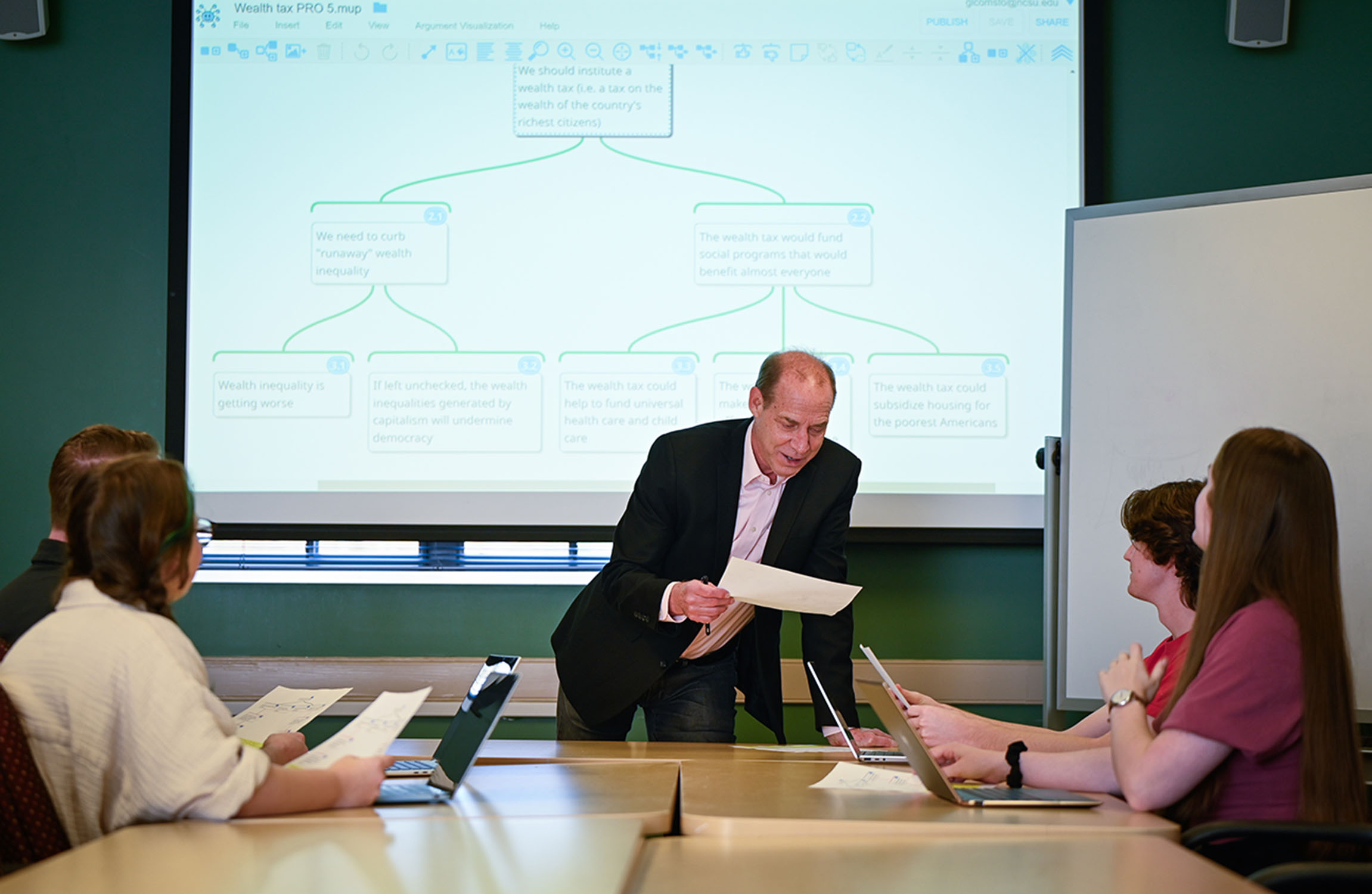Seven Tenure-Track Scholars Join Faculty

The College of Humanities and Social Sciences welcomes seven new tenure-track faculty to its ranks this fall. Their research interests range from international security to digital humanities to obesity and stigma. Meet these stellar scholars, researchers and teachers.

Helen J. Burgess joins the Department of English as an associate professor in the area of digital humanities and new media publication.
- Ph.D. (English), West Virginia University, 2003
- M.A. (English with Distinction), Victoria University of Wellington, New Zealand, 1997
- B.A. (English with Honors), Victoria University of Wellington, New Zealand, 1994
Helen Burgess is active in the new media research community as editor of the online journal Hyperrhiz: New Media Cultures; technical editor of Rhizomes: Cultural Studies in Emerging Knowledge; and editorial board member for the Computing Literature series at West Virginia University/University of Paris VII Vincennes Saint-Denis. She is coauthor of Red Planet: Scientific and Cultural Encounters with Mars and Biofutures: Owning Body Parts and Information, both titles published in the Mariner10 interactive DVD-ROM series at the University of Pennsylvania Press. Her latest completed work is Highways of the Mind, an interactive book forthcoming in 2014 from Penn Press. She has interests in digital humanities, electronic literature, critical code studies, multimedia and web development, and science fiction.

Jeni L. Burnette joins the Department of Psychology as an assistant professor in the area of Psychology in the Public Interest.
- Ph.D. (Social Psychology), Virginia Commonwealth University, 2006
- M.A. (Social Psychology), Virginia Commonwealth University, 2004
- B.A. (Psychology), University of North Carolina at Chapel Hill, 2000
Jeni Burnette’s research applies basic social psychological theories to understanding significant social issues such as obesity and stigma. She primarily focuses on how mindsets matter for dieting motivation and for achieving weight-loss goals. Her recent work examines how public health messages shape personal beliefs about weight, stigma and body shame. Her work has been published in journals including Psychological Bulletin, Psychological Science, Journal of Personality and Social Psychology, Journal of Experimental Social Psychology, and Personality and Social Psychological Bulletin.

Alan Ellis joins the Department of Social Work as an assistant professor.
- Ph.D. (Social Work), University of North Carolina, 2012
- M.S.W. (Social Work), University of North Carolina, 1996
- B.A. (Computer Science and Spanish), Dartmouth College, 1990
Durham native Alan Ellis comes to NC State after 17 years at UNC-Chapel Hill, which he spent in various research capacities, including 11 years as a research associate at the Cecil G. Sheps Center for Health Services Research. He has authored or co-authored 35 peer-reviewed papers, focusing primarily on mental health services. His key research interests are mental health promotion, child well-being and methods for comparative effectiveness research. In addition to research, Ellis enjoys writing and teaching.

Melissa Hardesty joins the faculty in the Department of Social Work.
- Ph.D. (Social Work), University of Chicago, 2014
- M.S.W. (Social Work), Indiana State University, 2007
- B.S. (Psychology), Indiana State University, 1999
Melissa Hardesty’s recently completed dissertation research was an ethnographic study of frontline adoption and foster care caseworkers in a concurrent planning foster care adoption program. It focused on the ways in which workers handle simultaneous calls to be objective and offer perspective, and how they juggle “ethical labor,” including balancing ethical principles and the demands of day-to-day practice. Her other research interests include gender and sexuality, kinship and ethnographic methods.

Andrew Johnston joins the Department of English as an assistant professor.
- Ph.D. (Cinema and Media Studies), University of Chicago, 2011
- M.A. (American Studies), University of Maryland, College Park, 2004
- B.A. (English Literature), College of William and Mary, 2001
Andrew Johnston comes to NC State from the Film and Media Studies Program and English Department at Amherst College. His research areas include film history and theory, animation, avant-garde film, aesthetic theory, media archaeology, and areas of the digital humanities such as the history of computational technologies and digital archives. His forthcoming book, Pulses of Abstraction: Episodes from a History of Animation, examines the history of abstract animation in cinema and new media from the 1950s through the 1970s. He is currently writing a series of articles about the development of computer-generated imagery and methods of archiving and transcoding these works on contemporary platforms.

Robert Reardon joins the School of Public and International Affairs as an assistant professor of political science. His areas of specialization are in international security, nuclear proliferation, and science and technology policy.
- Ph.D. (Political Science), Massachusetts Institute of Technology, 2010
- M.S. (Biology), University of Illinois
- B.A. (History), Columbia University, 1993
Robert Reardon’s teaching and research lies at the nexus of international security and science and technology policy. The principal focus of his research has been on the effectiveness of sanctions, military force and diplomacy as policy tools to prevent the spread of nuclear weapons. He has written extensively on Iran’s nuclear program, including Containing Iran (2010), and has published on the topic in International Security, National Interest, and several edited volumes. Previously, Reardon was a research fellow in the International Security Program and the Project on Managing the Atom at Harvard’s Belfer Center for Science and International Affairs.

Kathleen M. Vogel joins the School of Public and International Affairs as an associate professor with tenure and as director of the college’s interdisciplinary studies program called Science, Technology and Society.
- Ph.D. (Chemistry), Princeton University, 1998
- M.A. (Chemistry), Princeton University, 1995
- B.A./B.S. (Biology, Chemistry, Spanish), Drury College, 1993
Kathleen Vogel’s research focuses on the social and technical dimensions of bioweapons threats and the production of knowledge in intelligence assessments. Prior to joining NC State’s faculty, Vogel was an associate professor at Cornell University with a joint appointment in the Department of Science and Technology Studies and the Judith Reppy Institute for Peace and Conflict Studies. Vogel was also previously appointed as a William C. Foster Fellow in the U.S. Department of State’s Office of Proliferation Threat Reduction in the Bureau of Nonproliferation. Vogel has also spent time as a visiting scholar at the Woodrow Wilson International Center for Scholars, American Association for the Advancement of Science, Cooperative Monitoring Center, Sandia National Laboratories and the Center for Nonproliferation Studies, and the Monterey Institute of International Studies.


